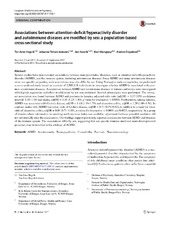| dc.description.abstract | Several studies have demonstrated associations between neuropsychiatric disorders, such as attention-deficit/hyperactivity disorder (ADHD), and the immune system, including autoimmune diseases. Since ADHD and many autoimmune diseases show sex-specific properties, such associations may also differ by sex. Using Norwegian national registries, we performed a cross-sectional study based on a cohort of 2,500,118 individuals to investigate whether ADHD is associated with common autoimmune diseases. Associations between ADHD and autoimmune diseases in females and males were investigated with logistic regression and effect modification by sex was evaluated. Several subanalyses were performed. The strongest association was found between ADHD and psoriasis in females, adjusted odds ratio (adjOR) = 1.57 (95% confidence interval: 1.46–1.68) and males, adjOR = 1.31 (1.23–1.40); p value for interaction < 0.0001. Furthermore, among females, ADHD was associated with Crohn’s disease, adjOR = 1.44 (1.16–1.79) and ulcerative colitis, adjOR = 1.28 (1.06–1.54). In contrast, males with ADHD had lower odds of Crohn’s disease, adjOR = 0.71 (0.54–0.92), in addition to a trend for lower odds of ulcerative colitis, adjOR = 0.86 (0.71–1.03); p values for interaction < 0.0001 and 0.0023, respectively. In a group of females where information on smoking and body mass index was available, adjustment for these potential mediators did not substantially alter the associations. Our findings support previously reported associations between ADHD and diseases of the immune system. The associations differ by sex, suggesting that sex-specific immune-mediated neurodevelopmental processes may be involved in the etiology of ADHD. | en_US |

